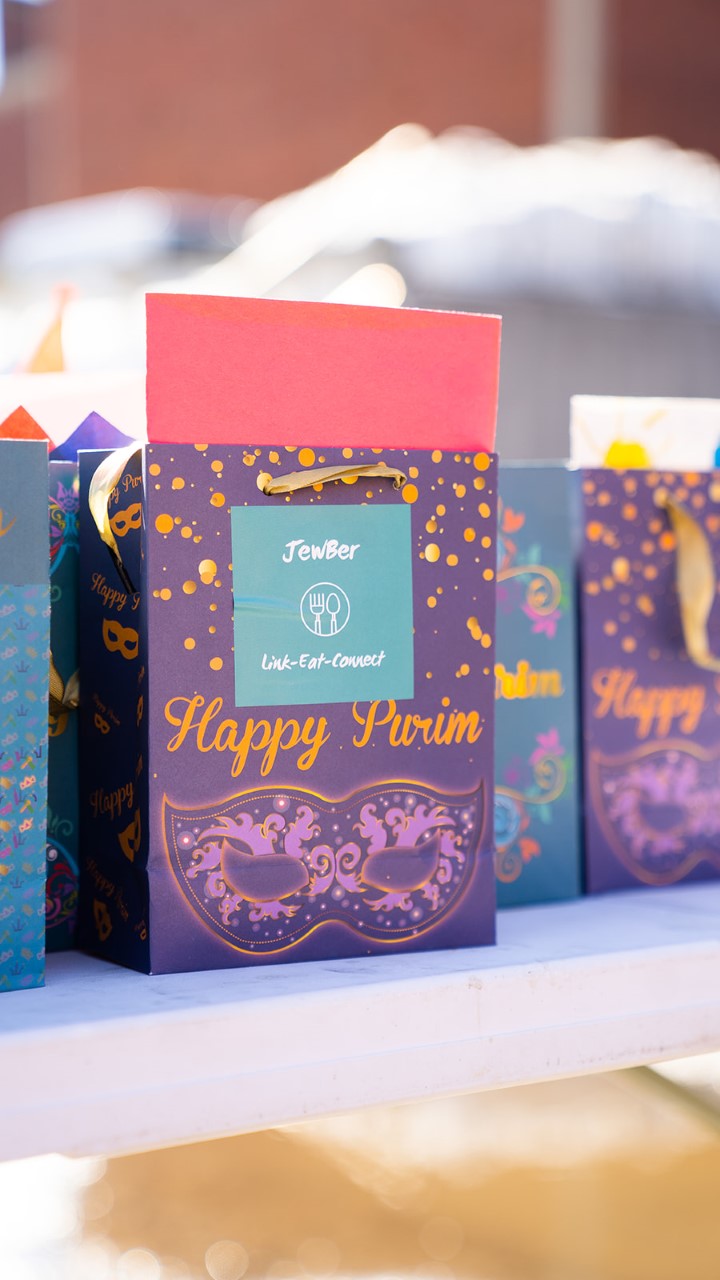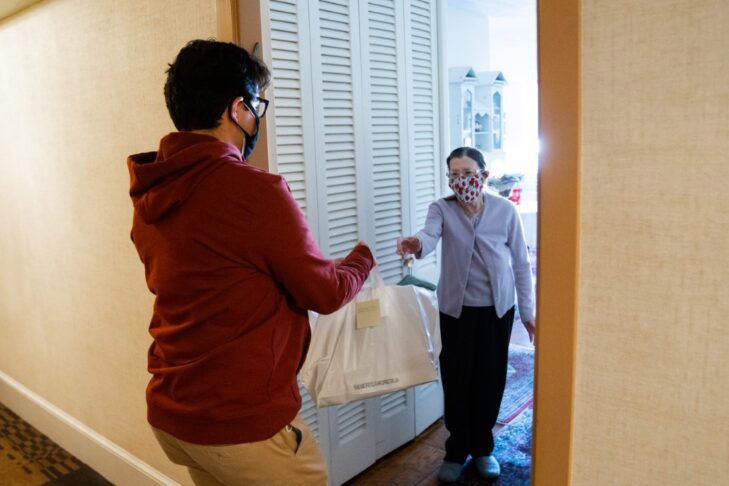On Feb. 26, as Jewish communities around the world gathered virtually from the comfort of their homes to celebrate Purim together, a group of Boston-based college students packed their cars and drove off to social distance deliver over 160 Shabbat meals and michloach manot to Holocaust survivors on the holiday. Brought together through the JewBer Dorot Program, these volunteer students worked to bridge the ever-growing gap between 20-year-olds and the often-forgotten elderly population.
The Dorot Program is an inter-generational initiative designed to connect students and young adults to Holocaust survivors. Built around volunteerism and community service, Dorot unites college students to deliver Shabbat meals to survivors who are homebound and in the need of support during this difficult time.
“College students are looking to make a difference now more than ever before. We designed the Dorot program to provide a once-in-a-lifetime opportunity for these young adults to serve the moment and give back to the Jewish community at large,” said Simon Luxemburg, who co-founded JewBer with friends in April 2020.
The virus makes Holocaust survivors one of the most vulnerable age groups, leading to an increase in challenges. There is a need for meals as well as social connection, which we can all relate to in some way given the past year.

“I feel that it’s incredibly important for us to connect with survivors from the Holocaust,” said Arielle Leeman, a student volunteer from Brandeis University. “I also wanted to be able to do a mitzvah, and this is such a beautiful way to do that in the area.”
Leeman delivered to three survivors last week as part of the program.
“It’s a really special way to give my time and my energy. It’s a form of tzedakah,” Leeman said. “Unconditional giving leads to unconditional loving. You truly can develop a sense of closeness with somebody when you give.”
Though this wasn’t Leeman’s first experience interacting with Holocaust survivors, it was one that made a huge impact on her. Leeman said the Dorot Program provided her an opportunity to work with a group whose numbers are dwindling. She felt an obligation to understand and work with the survivors. It had a tremendous impact, she said, on her understanding of the Jewish community.
“This really was a very, very beautiful thing,” Leeman said. “It felt more personal. I actually spoke for quite a while with two of the survivors. There was a very warm welcome.”
Leeman was able to add a personal touch to the delivery that wouldn’t have come from UberEats or DoorDash.
“We stood at a distance with masks and we were able to speak for a bit,” she said. “It was really wonderful to talk and meet firsthand with some of these Holocaust survivors.”
This mindset is what JewBer was hoping to encompass with this program, according to Luxemburg.
“By naming this program Dorot, which translates from Hebrew to English as ‘generations,’ we were intentional in our goal of both students and survivors alike building COVID-safe connections to take with them forever,” said Luxemburg.
The food was catered by Dushez Kosher Catering in Newton. The meal was Moroccan-inspired with chicken soup and hamantaschen to celebrate Purim.
“It’s my honor,” said Yoel Konstantine, owner of Dushez. “This is a big point to commemorate an era. I’m happy that JewBer is coordinating with us and that we’re doing it for a good cause.”
The Holocaust survivors also seemed appreciative.
“My thanks for the delicious gourmet meal, from soup to dessert. You spoil me,” survivor Judith Podolsky shared with JewBer, adding that the volunteers “take time out to deliver to the elderly. It takes special people to do that.”
In addition to the meals, each Holocaust survivor received a letter written by third grade students from Solomon Schechter Day School.
“The students were able to fulfill two of the mitzvot of Purim: matanot l’evyonim, giving to the elderly, and mischloach manot, sending food to others to spread joy,” teacher Anna Stern said. “I love that they were able to have a connection with elderly people in the community, particularly during this time.”

Stern said the students from the Newton-based school also appreciated the experience.
“I know the students felt good about their actions and hoped they made someone else’s day a little bit brighter,” Stern said.
Eighth grade students at Jewish Community Day School in Watertown also participated in the Dorot Program.
“It’s certainly in the spirit of Purim,” teacher Oren Kaunfer said.
The students, who are currently studying the Holocaust in their social studies class, created mishloach manot filled with grape juice and other goodies like hamantashen, sesame candies, lollipops and Bissli. Kaunfer noted that the volunteer experience is more meaningful than donating money or signing a petition since it’s hands-on and the students have a direct impact.

“It was powerful to know survivors were the recipients,” Kaunfer said. “The work that JewBer is doing is very important.”
Since April of last year, JewBer has provided over 2,300 meals to Holocaust survivors, low-income families and front-line heroes in the Boston area. Through a collaboration with kosher and Israeli small businesses in the city, the JewBer team has brought communities together to support many throughout these unprecedented times.
The Dorot Program will continue on March 19 and April 16. College students and young adults are invited to sign up and participate by visiting jewberboston.org/dorot. If you’d like to support this initiative and help ensure that all Holocaust survivors in the Greater Boston area can receive meals through this important program, please click here.
This post has been contributed by a third party. The opinions, facts and any media content are presented solely by the author, and JewishBoston assumes no responsibility for them. Want to add your voice to the conversation? Publish your own post here. MORE



